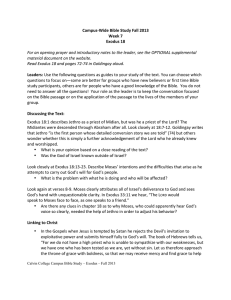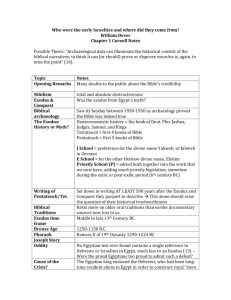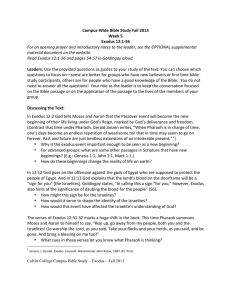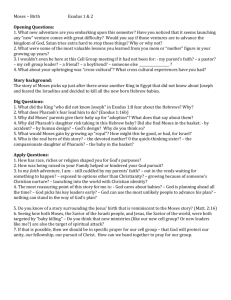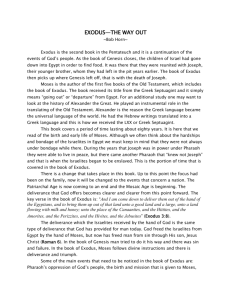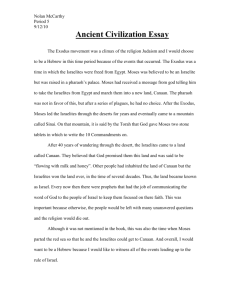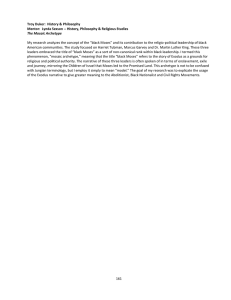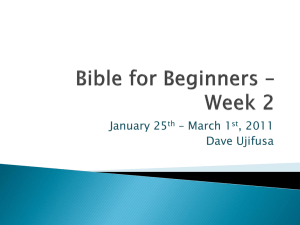Document 14396632
advertisement
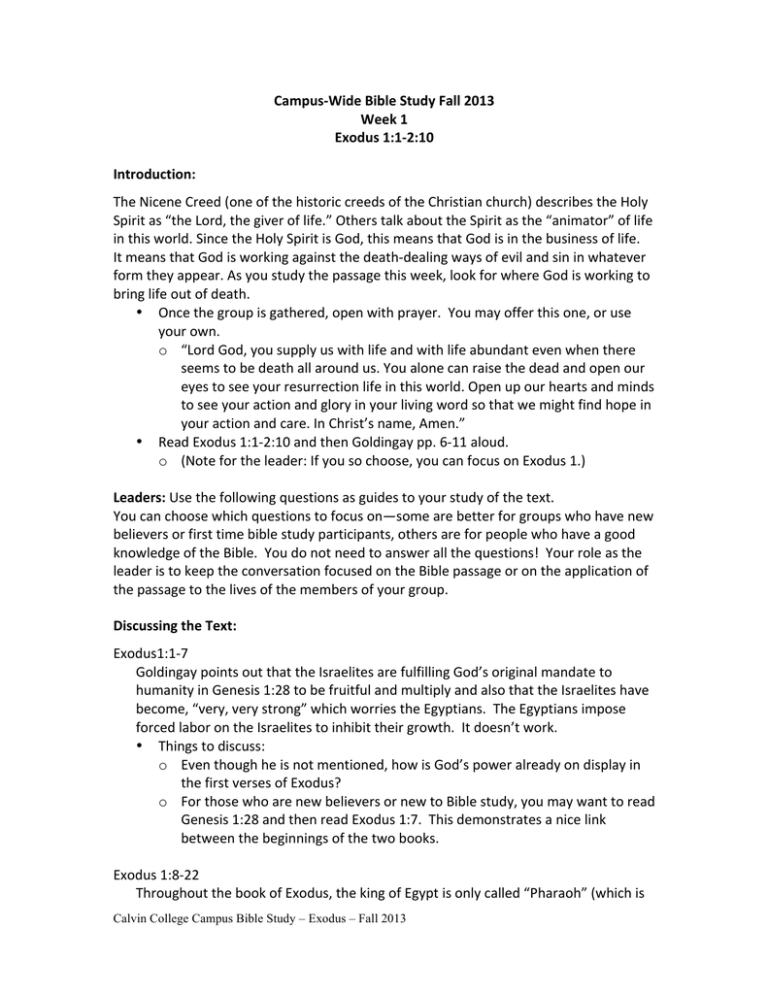
Introduction: Campus-­‐Wide Bible Study Fall 2013 Week 1 Exodus 1:1-­‐2:10 The Nicene Creed (one of the historic creeds of the Christian church) describes the Holy Spirit as “the Lord, the giver of life.” Others talk about the Spirit as the “animator” of life in this world. Since the Holy Spirit is God, this means that God is in the business of life. It means that God is working against the death-­‐dealing ways of evil and sin in whatever form they appear. As you study the passage this week, look for where God is working to bring life out of death. • Once the group is gathered, open with prayer. You may offer this one, or use your own. o “Lord God, you supply us with life and with life abundant even when there seems to be death all around us. You alone can raise the dead and open our eyes to see your resurrection life in this world. Open up our hearts and minds to see your action and glory in your living word so that we might find hope in your action and care. In Christ’s name, Amen.” • Read Exodus 1:1-­‐2:10 and then Goldingay pp. 6-­‐11 aloud. o (Note for the leader: If you so choose, you can focus on Exodus 1.) Leaders: Use the following questions as guides to your study of the text. You can choose which questions to focus on—some are better for groups who have new believers or first time bible study participants, others are for people who have a good knowledge of the Bible. You do not need to answer all the questions! Your role as the leader is to keep the conversation focused on the Bible passage or on the application of the passage to the lives of the members of your group. Discussing the Text: Exodus1:1-­‐7 Goldingay points out that the Israelites are fulfilling God’s original mandate to humanity in Genesis 1:28 to be fruitful and multiply and also that the Israelites have become, “very, very strong” which worries the Egyptians. The Egyptians impose forced labor on the Israelites to inhibit their growth. It doesn’t work. • Things to discuss: o Even though he is not mentioned, how is God’s power already on display in the first verses of Exodus? o For those who are new believers or new to Bible study, you may want to read Genesis 1:28 and then read Exodus 1:7. This demonstrates a nice link between the beginnings of the two books. Exodus 1:8-­‐22 Throughout the book of Exodus, the king of Egypt is only called “Pharaoh” (which is Calvin College Campus Bible Study – Exodus – Fall 2013 like calling someone “King” rather than “King Charles”). He is never given a proper name. “King” is thwarted in his plans by the midwives whose names are recorded: Shiphrah and Puah. Goldingay writes, “Telling us the midwives’ names makes them real people; they are not just anonymous functionaries.” He goes on to say, “It is less important for the representatives of the Egyptian court to be so” (10). • Things to discuss: o What is the author of Exodus communicating by naming the midwives and not naming Pharaoh? o What might this say about who or what God values? o Who has the strength or ability to control life in this passage? o If you have members who are more advanced in bible knowledge, you may want to think about other stories or occasions where names or naming plays an important role in scripture. How does God talk about our names? (e.g. written on his hand, written in the book of life) Exodus 2:1-­‐10 Fun Fact: Moses is from the house of Levi, which is the tribe that was set apart to serve as priests for the people. (For more on the tribe of Levi, read Deuteronomy 18:2.) Remember this fact as we move through the book of Exodus. While some people could interpret Moses’ mother as abandoning him by placing him in the basket on the river, the Hebrew word that is used here to describe the basket is used only one other place in Scripture: to describe Noah’s ark. The ark (which you can read more about in Genesis 6-­‐8) which was a vessel of deliverance built by faith. • What is the author trying to tell us by the use of the same word for “basket” that was used for Noah’s ark? • What does this tell us about Moses’ mother? • What does this tell us about God? Pharaoh’s daughter gives Moses a name with resonance in Hebrew and Egyptian. In Egyptian the name means “son” but in Hebrew it is related to the verb meaning “pull out.” Pharaoh’s daughter explains that she names him this because she “drew him out of the water.” (Another Fun Fact: In Hebrew, Moses is pronounced MO-­‐sheh.) As we saw earlier, names are important in scripture. Ask those in your group with more knowledge of the Exodus story how they see this name lived out through Moses’ life. Discussing the world: Verse 8 says that “a new king arose over Egypt, who did not know Joseph.” This makes it clear that the people can no longer rely on their political or social connections to powerful people for stability and prosperity. However, the loss of this connection does Calvin College Campus Bible Study – Exodus – Fall 2013 not sever the people from the life of God. • How have you seen God sustain your or another person’s life in ways that seem to contradict conventional wisdom? • What is the difference between relying on God’s sustaining power and trusting in your ability to connect to the right people? The historian Laurel Thatcher Ulrich wrote a book called “Well-­‐Behaved Women Seldom Make History” which shows how women have shaped the history of the United States and the rest of the world by behaving “badly” and by going against the status quo and resisting the voices and mandates of the most “powerful” in their society. • How do we know when someone is disobeying an authority figure or law in order to obey God? • Could we ever imagine God calling us to “disobey” in some way in order to serve and obey God? • How can we tell if God is asking us to make a difficult decision that involves trusting him even when we cannot make sense of his leading? • What if our actions are viewed by some as negative and some as positive? How do we evaluate our own obedience to God? Pharaoh’s daughter gives Moses his name, which becomes a part of his identity, part of the way in which he understands himself. • What are some ways that you have been “named,” what are the voices that have influenced your understanding of yourself? • Are these voices true? • Do they lead you to life or to death? Calvin College Campus Bible Study – Exodus – Fall 2013
